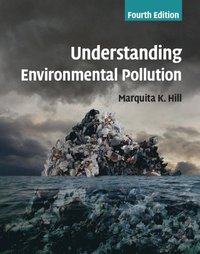
- Format
- Häftad (Paperback)
- Språk
- Engelska
- Antal sidor
- 466
- Utgivningsdatum
- 2020-07-09
- Upplaga
- 4
- Förlag
- Cambridge University Press
- Illustrationer
- Worked examples or Exercises; 44 Tables, black and white; 70 Halftones, black and white; 35 Line dra
- Dimensioner
- 272 x 216 x 20 mm
- Vikt
- Antal komponenter
- 1
- ISBN
- 9781108436106
- 1271 g
Understanding Environmental Pollution
- Skickas från oss imorgon
- Fri frakt över 249 kr för privatkunder i Sverige.
Passar bra ihop
De som köpt den här boken har ofta också köpt Nuclear War av Annie Jacobsen (inbunden).
Köp båda 2 för 973 krKundrecensioner
Recensioner i media
Review of previous edition: 'This book, aimed mainly at students, provides a thorough background to pollution, from global issues to personal pollution in the home ... This book provides an excellent introduction to the subject, providing the right information to enable students to evaluate environmental problems for themselves.' Environmental Assessment Magazine
Review of previous edition: '... a clear and well organised US-based text.' Waste Planning
Review of previous edition: ' ... this book forms a very useful introduction to pollution problems, and would also suit a more general readership, including members of the public with an interest in pollution matters.' Marine Pollution Bulletin
Review of previous edition: 'There is a wealth of statistical information given, and jargon is either studiously avoided or fully explained. ... this is a useful 'primer' for students and interested members of the public.' Journal of Biological Education
'The new edition of this popular textbook is wide-ranging, engaging, and easily accessible. It is a superb resource for students studying the causes, consequences, and management of environmental pollution.' James Rothwell, University of Manchester
'Marquita Hill's Understanding Environmental Pollution has been an indispensable text for my environmental science course over the past ten years. She presents a wealth of information on the significant environmental issues facing our society in a well-organized, straightforward, clearly written text. I particularly applaud her section on risk management, which is applicable to the many issues she presents, and the many text-boxes among the chapters that bring to life issues, associated science, and solutions to the problems we face.' John Dorsey, Loyola Marymount University
'The fourth edition of Understanding Environmental Pollution provides a comprehensive and straightforward introduction to a wide range of environmental topics, including toxicity and risk assessment; a survey of air, water, and land pollution; energy use; and global change. A unique and intriguing focus of this book is the emphasis not merely on pollution reduction but on switching to a circular economy that features closed-loop, zero-waste, zero-emission systems and processes.' Usha Rao, St Joseph's University
Övrig information
Marquita K. Hill holds a Ph.D. in comparative biochemistry from the University of California, Davis. She was assistant and then associate professor in the biochemistry department at Virginia Tech, Blacksburg. Later, at the University of Maine's Department of Chemical Engineering, she conducted research funded by the US Department of Energy and the US Environmental Protection Agency. Then, after educating herself as an environmental scientist, she taught courses in environmental pollution, which led to the text Understanding Environmental Pollution. She was co-founder of the Green Campus Consortium of Maine, an organization working toward sustainable environmental management in Maine's higher-education institutions. For nine years she served on an advisory committee for International Paper's mill in Skowhegan, Maine. During those same years she was a visiting scholar at the Harvard School of Public Health.
Innehållsförteckning
Preface; Acknowledgements; List of abbreviations and acronyms; 1. Understanding pollution; 2. Reducing pollution to reduce risk; 3. Chemical toxicity; 4. Chemical exposures and risk assessment; 5. Ambient air pollution; 6. Acid deposition; 7. Global warming and ocean acidification; 8. Energy and pollution; 9. Stratospheric ozone depletion; 10. Water pollution; 11. Drinking water pollution; 12. Solid waste; 13. Hazardous waste; 14. Persistent, bioaccumulative, and toxic chemicals; 15. Metals; 16. Pesticides; 17. Indoor air pollution; 18. Zero waste, zero emissions; Appendix. Chemistry - basic concepts; Index.
Du kanske gillar
-
Live Beautiful
Athena Calderone
Inbunden


